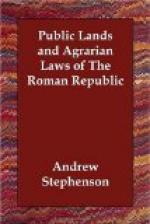Upon the establishment of the empire, the public lands became a vast manorial estate whose over-lord was the emperor himself.
[Footnote 1: L. Langii, Commentationis de Legibus Antoniis a Cicerone Phil., V, 4, 10; Commemoratis particula prior et posterior; Lipsiae, 1882; Lange, Roem. Alter., III, 499, 503, 526; Marquardt u. Momm., Roem. Alter., IV, 116.]
[Footnote 2: Lange, Comm., II, 14.]
[Footnote 3: Cicero, Phil., VI, 5, 14; XI, 6, 13.]
[Footnote 4: Phil., V, 7, 20.]
[Footnote 5: Langii, Comm., II, 14.]
[Footnote 6: Cic., Phil., II, 17, 43; II, 39, 101; III, 9, 22; VIII, 8, 26; Dio Cass., 45, 30; 46, S.]
[Footnote 7: Cic., Phil., V, 4, 10; V, 19, 53; X, 8, 17; VIII, 15, 31.]
[Footnote 8: [Greek: “Dosesi ton Italikon poleon oktokaideka ... osper autois anti taes polemias dorilaeptoi genomenai.... Outo men ta kallista taes Italias to strato diegrephon.”] App., IV, 3.]



